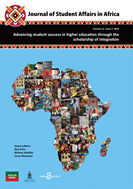Counsellors’ experiences of integrating virtual interventions to provide mental health support for students
DOI:
https://doi.org/10.24085/jsaa.v12i2.5449Keywords:
counselling, student mental health, virtual interventionsAbstract
This study sought to explore the experiences of counsellors at Nelson Mandela University's Emthonjeni Student Wellness counselling unit regarding the implementation of a blended counselling model, integrating virtual interventions into the existing practice model. Grounded theory methodology was employed to generate an understand of the evolving counselling practices and the growing acceptance of this model in a student counselling centre at a South African public university. This requires integration of psychological knowledge and experience with other domains, such as information technology, professional ethics, and higher education student support. Data were collected through semi-structured interviews with counsellors working within the university’s counselling unit. The emergent theoretical framework shed light on the evolution of counselling practices within the university context and how students’ mental health and wellness can be supported using virtual interventions. The main themes identified in the findings included: (i) the necessary transition to integration, (ii) challenges and obstacles, (iii) benefits and advantages (iv) diversity and uniqueness, and (v) training points for counsellors. Key concepts that can form the basis of a blended counselling model and the necessary training and development of counsellors in such a model, include (i) adaptation and flexibility, (ii) technological proficiency, (iii) cultural sensitivity and diversity, and (iv) boundary management. Each of these key concepts relate to areas for skill development in counsellors and would benefit from an integrative, evidence- and scholarship-based approach to benefit student counselling services within South African public universities.
Downloads
Published
Issue
Section
License
Copyright (c) 2024 Gregory Mitchell, Dalray Gradidge, Nomalungelo Ntlokwana

This work is licensed under a Creative Commons Attribution-NonCommercial-ShareAlike 4.0 International License.
Authors who publish with this journal agree to the following terms:
Authors retain copyright and grant the journal right of first publication with the work simultaneously licensed under the Creative Commons Attribution Share-alike 4.0 International License that allows others to share the work with an acknowledgement of the work's authorship and initial publication in this journal.
Authors are able to enter into separate, additional contractual arrangements for the non-exclusive distribution of the journal's published version of the work (e.g., post it to an institutional repository or publish it in a book), with an acknowledgement of its initial publication in this journal.
Authors are permitted and encouraged to post their work online (e.g., in institutional repositories or on their website) prior to and during the submission process, as it can lead to productive exchanges, as well as earlier and greater citation of published work (See: The Effect of Open Access).


